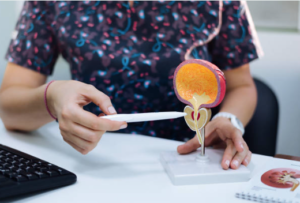How To Maximize your Prostate care – 30 FAQ’s answered.
 How To Maximize your Prostate care – 30 FAQ’s answered.
How To Maximize your Prostate care – 30 FAQ’s answered.
FAQ 1. What is the prostate gland?
Answer: A small, walnut-shaped gland located at the base of the bladder, just below the urethra in men. It produces some of the fluid in semen.
FAQ 2.What are common prostate problems that occur as men age?
BPH (Benign Prostatic Hyperplasia): Non-cancerous enlargement of the prostate.
Prostatitis: Inflammation of the prostate, which can be bacterial or non-bacterial in origin.
Prostate Cancer: Cancerous growth in the prostate gland.
FAQ 3. What are the symptoms of prostate problems?
• Frequent urination, especially at night
• Weak or interrupted urine flow
• Difficulty starting or stopping urination
• Urgency to urinate
• Pain or burning during urination
• Blood in urine or semen
FAQ 4. How can I maintain good prostate health?
• Eat a healthy diet rich in fruits, vegetables, and whole grains.
• Maintain a healthy weight.
• Exercise regularly.
• Limit alcohol and caffeine intake.
• Avoid smoking.
• Manage stress.
• Get regular prostate exams.
• Natural Remedies to Support Prostate Health
FAQ 5. Does saw palmetto help with prostate health?
Answer: Studies have shown mixed results, but saw palmetto may be helpful in reducing symptoms of BPH.
FAQ 6. What is pygeum and how does it work for the prostate?
Answer: Pygeum is derived from the bark of the African plum tree. It has anti-inflammatory properties and might help with BPH symptoms.
FAQ 7. Can stinging nettle be beneficial to the prostate?
Answer: Stinging nettle has some potential in managing BPH symptoms, potentially due to its anti-inflammatory effects.
FAQ 8. How does lycopene affect prostate health?
Answer: Lycopene, a powerful antioxidant found in tomatoes and other red-colored fruits, may have a protective effect against prostate cancer.
FAQ 9. Are pumpkin seeds good for the prostate?
Answer: Pumpkin seeds are rich in zinc, which is important for prostate health. They may help reduce BPH symptoms.
FAQ 10. Can green tea help with prostate problems?
Answer: Green tea contains antioxidants that may have beneficial effects on prostate health, potentially decreasing the risk of prostate cancer.
FAQ 11. Is beta-sitosterol a useful prostate supplement?
Answer: Beta-sitosterol is a plant-based compound that may ease urinary symptoms associated with BPH.
FAQ 12. How does exercise support prostate health?
Answer: Regular exercise helps maintain a healthy weight, improves circulation, and reduces inflammation – all beneficial for prostate health.
FAQ 13. When should I see a doctor about my prostate?
Answer: If you experience any symptoms of prostate problems, it’s important to see your doctor for a diagnosis and treatment plan.
FAQ 14. Are there foods I should avoid for prostate health?
Answer: Limit saturated and trans fats, red meat, processed foods, sugary drinks, and excessive alcohol.
FAQ 15. What are Kegel exercises and how do they help?
Answer: Kegel exercises help strengthen pelvic floor muscles, which may improve bladder control and urinary symptoms associated with prostate problems.
FAQ 16. Are warm baths helpful for prostate symptoms?
Answer: Warm baths can relax muscles and temporarily ease discomfort associated with prostate conditions.
 FAQ 17. Can stress affect my prostate health?
FAQ 17. Can stress affect my prostate health?
Answer: Stress can worsen urinary symptoms and negatively impact overall health. Stress management techniques are beneficial.
FAQ 18. Can cranberry juice help with prostate health?
Answer: While popularly associated with urinary health in general, cranberry juice might not have direct benefits for prostate problems. However, its hydrating properties are generally helpful.
FAQ 19. Does garlic have any benefits for the prostate?
Answer: Garlic contains compounds with anti-inflammatory and antioxidant properties, which might offer some indirect benefit to prostate health.
FAQ 20. Is pomegranate beneficial to the prostate?
Answer: Pomegranates are rich in antioxidants and have shown potential in slowing the progression of prostate cancer in some studies.
FAQ 21. Is there a specific diet that is best for prostate health?
Answer: Focus on a healthy, balanced diet rich in fruits, vegetables, whole grains, and lean protein. Some diets with potential prostate benefits are the Mediterranean diet and plant-based diets.
FAQ 22. What are some of the best vegetables for prostate health?
Answer: Cruciferous vegetables like broccoli, cauliflower, kale, and Brussels sprouts contain compounds that may protect against prostate cancer. Leafy greens, tomatoes, and peppers are also excellent choices.
FAQ 23. Which fruits have the strongest connection to prostate health?
Answer: Berries (blueberries, raspberries, strawberries), citrus fruits (oranges, grapefruits), and grapes are packed with antioxidants and beneficial compounds that may support prostate health.
FAQ 24. Can flaxseeds help with prostate issues?
Answer: Flaxseeds are a rich source of omega-3 fatty acids and lignans, which may have anti-inflammatory and potential anti-cancer effects on the prostate.
FAQ 25. Are there herbs (other than those already mentioned) that can help?
Answer: Additional herbs with potential, though less-studied, benefits for prostate health include turmeric, ginger, and Echinacea.
FAQ 26. Do soy products have an impact on the prostate?
Answer: Soy contains isoflavones, which have weak estrogen-like effects. Their role in prostate health is complex, but moderate soy intake is likely safe and potentially beneficial.
FAQ 27. What about mushrooms for prostate health?
Answer: Certain types of mushrooms, such as reishi and maitake, possess immune-boosting properties, which might have indirect benefits for prostate health.
FAQ 28. Is there a role for vitamin D in supporting the prostate?
Answer: Research suggests a link between low vitamin D levels and an increased risk of prostate cancer. Ensuring adequate vitamin D intake is important for overall health.
FAQ 29. Can zinc supplements help with prostate health?
Answer: Zinc is essential for prostate function, and zinc deficiency can worsen prostate problems. Supplementation might be helpful if dietary intake is low.
 FAQ 30. Are there any natural remedies that specifically help with prostatitis?
FAQ 30. Are there any natural remedies that specifically help with prostatitis?
Answer: Along with other natural remedies, natural options like quercetin (a plant pigment) and pollen extract show some promise in managing prostatitis symptoms.
SEE ALSO: Latest Prostate Supplements >>
NOTE :
The information provided in this article and the rest of this website is intended for general knowledge and informational purposes only, and does not constitute medical advice. It is essential to consult a qualified healthcare professional for the diagnosis and treatment of any health condition. Never disregard professional medical advice or delay in seeking it because of something you have read in this article.

